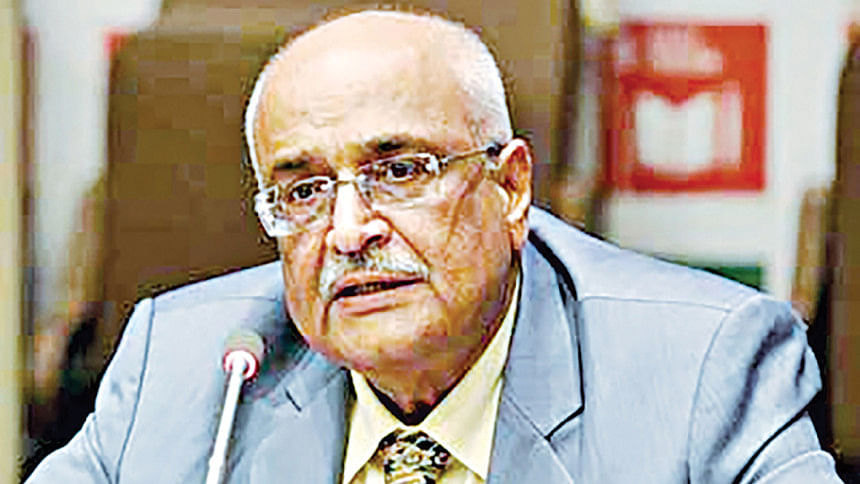Budget of expectations became budget of disappointment

This government came into power through a big change. On this ground, people had a huge expectation from this budget.
The proposed budget for fiscal 2025-26 failed to meet people's huge expectations, said economists, entrepreneurs and representatives from marginal people.
"This government came into power through a big change. On this ground, people had a huge expectation from this budget," said Debapriya Bhattacharya, convenor of Citizen's Platform for SDGs, Bangladesh.
Bhattacharya's comment came in a discussion titled "National Budget 2025-26: What is There for the Left-behinds?", organised by the Citizen's Platform for SDGs, Bangladesh held at the capital's Lakeshore Hotel.
The budget failed to address people's aspirations.
"So the budget of expectations became the budget of disappointment."
The budget formation process was problematic as the government did not consult with all the political parties and stakeholders, he said.
The interim government formed several commissions and committees and they have done their work free of cost.
But their activities and suggestions were not addressed in the budget, said Bhattacharya, who headed the white paper committee on the Bangladesh economy.
"The government did not take the recommendations from the commissions seriously -- I feel cheated," said Syed Sultan Uddin Ahmed, head of the labour reform commission.
The budget could have removed some of the inequality in the society by implementing suggestions from several reform commissions, he added.
The structure of the proposed budget is the same as the previous ones said Bhattacharya, also a distinguished fellow at the Centre for Policy Dialogue.
On top of that, many steps were taken in the budget which went against neglected and marginal people, he added.
Core expectations from the budget were strengthening macroeconomic stability, incorporating reform, safeguarding marginalised citizens and promoting jobs and investment, said Towfiqul Islam Khan, senior research fellow of CPD.
Though the government acknowledged the reports of the white paper committee, task force and reform commission, neither the budgetary allocations nor the fiscal measures were systematically designed to reflect the recommendations.
"There is a striking disconnect between budgetary efforts and reform efforts," he added.
Since it is an interim government, implementation of reform measures cannot be expected from it, said Anu Muhammad, a former chairman of the economics department at Jahangirnagar University.
"I did not have huge expectations that it would implement reforms. But I expected that it will at least start reform activities like reducing the contribution of VAT and so on."
But they did not bring in any changes, he added.
This budget is not inclusive, and it was just several value adjustments of previous budgets, said Mahdi Amin, adviser to BNP acting chairman Tarique Rahman.
"This budget did not address how peoples' confidence will be boosted, or how the capacity of industries will be increased. If the government sought recommendations, the BNP could have provided those," he added.
There is a huge gap between expectations and what was provided in the budget, said Selim Raihan, professor at the University of Dhaka's economics department.
The expectation was the government would raise direct tax, lower indirect tax and provide higher allocation for the health and education sectors.
"But that did not happen. It is also not clear what the government would do to bring back macroeconomic stability."
Many targets were set in the budget that are not realistic, he said, citing the targets for private investment, GDP growth and revenue collection.
"Entrepreneurs are living in an uncertainty and they are suffering from lack of confidence -- this was not addressed in the budget."
The budget did not give priority to incorporating reforms, said Raihan, also executive director of the South Asian Network on Economic Modelling.
"We have missed an opportunity to bring a good change," he added.
Personal income tax was imposed in a way that middle-class people will face a higher burden in comparison to the high-income people, said Mustafizur Rahman, a distinguished fellow of the CPD.
While the interim government raised the social safety net allowances, the hike was lower than the rate of inflation. "How will disparity be reduced then?" he asked.
The government could have reduced its own operational expenses in the budget, said Snehasish Barua, managing director of SMAC Advisory Services.
Mahmud Hasan Khan, president of the Bangladesh Garment Manufacturers and Exporters Association, questioned the rationale for increasing the salaries of government service-holders.
He suggested reducing wastage and corruption in budget implementation as it would allow the government to do more for marginal people.
He cited the case of a family that has 11 TCB cards to further his point.
If the cards were distributed properly, 10 families could have benefitted from the government's spending, he said.

 For all latest news, follow The Daily Star's Google News channel.
For all latest news, follow The Daily Star's Google News channel. 



Comments